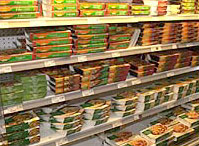Food additives affect children's behavior?
Parents in the UK are now advised not to give their children food that contains some additives until a new study of the relationship between these substances and the child's behavior results. Many people are concerned about the safety of colors and preservatives used in confectionery, soft drinks and processed foods in the UK after studies of the harmful effects of additives on children.
The University of Southampton's British Food Industry magazine cited a link between color, additives and behavioral signs such as anger, lack of concentration, hyperactivity and

Some types of ready-to-eat foods contain additives.(Photo: BBC)
aversion reaction. Some child health advocacy groups, such as the Active Children Support Organization, believe that children's behaviors are better when not using artificial colors and spices in food. However, the British Food Standards Agency (FSA) still has a formal statement and says wait until the new findings are published in a prestigious scientific journal.
In the past, FSA's chemical toxicology committee considered a 2002 study that should not use colorants in children's diets, because it would create ' important changes ' in Behavior not only in children shows hyperactivity. However, the committee did not make any conclusions because it was not possible to fully assess whether parents did not know if their children were affected. Instead, SFA has set up a research team to seek more convincing evidence.
Although all the additives tested in this study are safe and widely used in the European Union (EU), there are some colors banned in some countries, in there is America. Now Sainsbury is the first supermarket in the UK to announce that it will not sell soft drinks containing artificial colors and additives. Some other supermarkets are also reviewing the additive policy to pressure from customers.
N.MINH
- Two types of food additives have estrogen-like effects
- Additives negatively affect children's brains
- The Institute of Chemistry introduced the market for additives to replace borax
- How is gelatin food additive produced?
- People with kidney disease watch out for sodium and meet potassium
- 19 types of fruit juices and syrup are recalled because they contain DEHP
- Measures to handle when food poisoning at home
- Severe shock: This is what is in the familiar food
- Food processing impregnated ... votive additives!
- Additives in toothpaste can cause infertility
- How to choose confectionery, safe food on Tet holiday
- How do food preservatives harm young children?
 Green tea cleans teeth better than mouthwash?
Green tea cleans teeth better than mouthwash? Death kiss: This is why you should not let anyone kiss your baby's lips
Death kiss: This is why you should not let anyone kiss your baby's lips What is salmonellosis?
What is salmonellosis? Caution should be exercised when using aloe vera through eating and drinking
Caution should be exercised when using aloe vera through eating and drinking